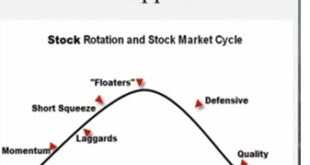There are two sides to any argument. Right now the question is: “Are cheaper commodities good or bad for stocks?” The answer is not so easy to explain. In part because it has to do with not only direction of price but speed of price and what other markets are saying which leads to how people react to the information at any given moment. Also, there are those that park their money, and those that move it around… There are those that move fast, and those that have too much to move to be able to move quickly. Looking at investing like an ocean… There are big waves which engulf smaller waves, and there are the faster, smaller waves.
The following is only a primer on how I have learned to attempt to make better sender of things.
When commodities are down fast overnight that is the sort of action that may very well trigger margin calls which creates forced selling. If someone (or some entity) is long oil futures or leveraged in oil stocks and overnight there is large drop they have to sell a lot to raise equity or selling will be done for them. (Not to mention those that sell in anticipation of margin calls of others and/or to avoid it themselves if selling were to persist or to maintain certain allocation percentages).
That selling will often trickle over into other areas and the temporary fear and forced selling creates more selling pressure than buying and sellers seeking a buyer leads to lower prices.
Especially true if multiple commodities are down fast simultaneously along with strong dollar and fast action in bonds in either direction signaling the perception of desperation to stimulate demand and shift of capital to “safety” or tightening borrowing requirements signaling the perception of difficulty borrowing and fears it may lead to deflation. It need not matter on what direction is good and bad for the market, the perception of it among enough people that believe in it and a large magnitude of a move is real enough to cause short term selling pressure that leads to more. Anything interpreted as a possible sign of deflation can be enough to cause selling pressure and a shift into “safety” or “quality”. Since there are many players with different ideas, theory, reactions, emotions, behaviors, motives, responsibilities, risk tolerance, goals, amount of leverage, strategies, etc… There is a lot of chaos within the market. It can be tough to decipher how many moving parts will react over time. To say one thing is good or bad for something else is looking at it too linearly. It depends not only upon context of other information, but in the context of your own timeframe and strategies as well. It also matters where market has accepted price before and how much capital is desperate. (Hard to articulate this since it is not the number of people that matter, but the total amount of capital behind each person’s reactions seeking buy or sell orders)
Someone that is long oil but off margin and has a lot of cash and intends building a position as just an allocation to a long term portfolio that contains other asset classes including bonds and stocks over the next several months would perhaps cheer oil going lower as they can lower the cost basis as they buy lower and they have only just started building it. Someone on margin long oil and stocks who suddenly has to make adjustments will only be able to look at it from a win/loss perspective.
One person’s mindset might be to buy at a discount and sell it at a target with time only variable that cannot be control or predict but playing for a big win and never taking a loss. They must buy at a deep enough discount or they cannot lose since they already are risking a low ROI if it takes more time than anticipated. Another might focus on both price and time and they are much less certain about whether they will be right or wrong but they will manage the price they take the loss and gain so that the system is likely to win over time. Rather than wait potentially years for something to turn around, they have to take a loss and the sooner, the better.
On the face of it one may be right that cheap oil and commodities are good for business and the consumer. But deflation is very bad for the business and consumer. If the market interprets cheaper oil and commodities as capital flow out of commodities and into stocks and happening wishing the context of expansion of money supply AND increase of the velocity of money (and circulation or concentration of it) then cheaper oil is an increase in disposable income for the consumer and will contribute to lower costs, higher growth. BUT if you interpret it as a sign deflation is near or already here, then prices of everything drops.
The cheap oil and commodities overnight are enough to trigger the believable fear for enough people to buy the story of deflation to make the reactions on that fear cause price movement and margin calls at least on the short term. Sometimes it is an over reaction. Sometimes not. Sometimes the very act of over reacting causes it to be real enough to last for awhile and be more violent than most anticipated as it puts enough people in a position where there is more forced selling and that forced selling changes entire moods and confidence in “the system” and that mood changes economic behaviors such as banks not lending and people unwilling to borrow. In other words, it can at times create a self-fulfilling prophesy.
Then there is “capitulation” selling or “selling exhaustion” which is another story.
If you enjoy the content at iBankCoin, please follow us on Twitter



